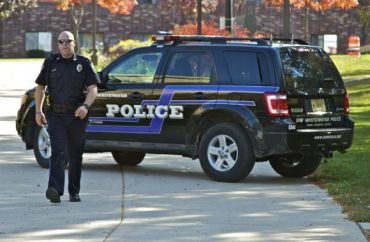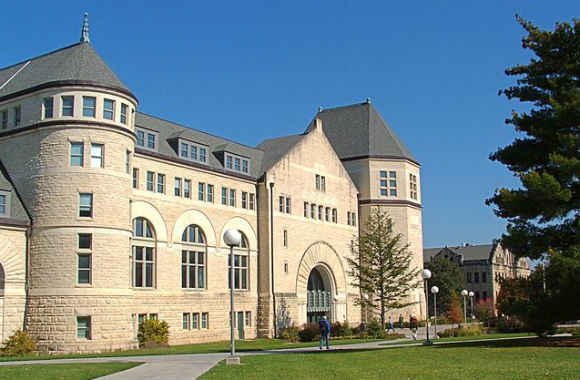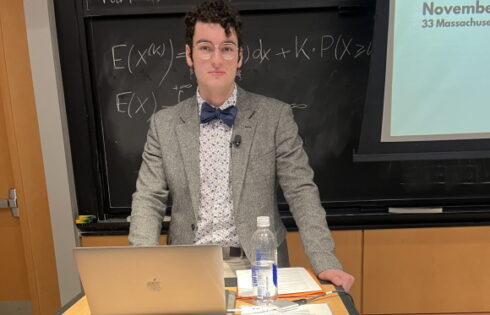
‘Substantial control’ over a ‘recognized fraternity’?
Kansas State University has provoked the wrath of the federal government by refusing to police the behavior of students when they leave campus.
The departments of Justice and Education recently filed a “Statement of Interest” in two lawsuits brought against KSU by students who claim they were raped off-campus in fraternity houses.
The agencies side with the plaintiffs, arguing that KSU is bound by Title IX to investigate regardless of where the behavior happened.
But the university isn’t making a new argument. Last year it took the unusual step of intervening in a lawsuit against the University of Kansas – by a student who was expelled for calling his ex-girlfriend a “psycho bitch” on Twitter – to argue that Title IX does not require off-campus policing.
MORE: Universities are using Title IX to suppress speech
The issue is whether the university has “substantial control” over an environment where sexual harassment or assault are alleged to have happened.
The fact that KSU officially recognizes the two fraternities whose houses are alleged to be the sites of the rapes may hamper its claim in court, a lawyer with a due-process group told The College Fix.
We are not ‘de facto police departments’ of the world
In its friend-of-the-court brief in the KU case last year, KSU argued that “the Supreme Court’s explicit limits on Title IX jurisdiction do not require universities to investigate or discipline students for off-campus, peer-to-peer conduct.”
To do so would turn universities into “de facto police departments with worldwide jurisdiction,” responsible for anything that happens to its students anywhere, KSU’s brief said.
The two lawsuits against KSU say that its refusal to investigate off-campus conduct “endangers students and violates federal law by creating a hostile learning environment for victims,” according to the Associated Press.
MORE: KSU tells KU you’re wrong on Title IX
Both cases involve off-campus fraternity parties, and both plaintiffs identify themselves by their real names.
Sara Weckhorst’s lawsuit says she drank to excess and blacked out at a party in 2014, and a fraternity member raped her while other people recorded and photographed the rape. Tessa Farmer, the other plaintiff, claims she had consensual sex while intoxicated but woke up the next morning while being sexually assaulted by another student.
Kansas State Refused To Investigate Fraternity Rapes Because They Happened Off-Campus https://t.co/5luo08KOR2
— College Candy (@CollegeCandy) July 9, 2016
The location of a crime is less important than the proximity of an attacker after an assault, the lawyer for both plaintiffs told the AP.
“Schools understand that attending school on a campus alongside an assailant can cause a hostile environment for a student” and “really prevent them from fully accessing their education and can affect their well-being,” said Cari Simon.
Key question: ‘deliberate indifference’
Marieke Tuthill Beck-Coon, senior program officer in the Foundation for Individual Rights in Education’s Individual Rights Defense Program, said the particulars of the two lawsuits could make this an uphill battle for KSU.
In a phone interview with The Fix, she cited the Supreme Court’s 1999 ruling in Davis v. Monroe, which found that a school “can be liable under Title IX if it is deliberately indifferent to harassment” and the incident “occurs where the school has substantial control.”
MORE: Kansas court rebukes sexual-harassment rules by the feds
The school could be held responsible if the harassment takes place in a university program, such as a “recognized fraternity,” Beck-Coon said.
In its brief in the KU case, Kansas State cited other courts that ruled that students’ conduct off-campus or when out of school is not the responsibility of the school.
In 2001’s C.R.K. v. USD 260, a federal court in Kansas found that a high school was not guilty of “deliberate indifference” by failing to investigate a rape allegation. It said the alleged assault had happened off-grounds months earlier, when school was not in session, and was already the subject of an ongoing criminal investigation.
Kansas State declined to elaborate its position to The Fix in an email, citing a policy to not comment on litigation: “The university will let the court resolve litigation matters.”
MORE: Department of Education’s rape standards aren’t enforceable
Like The College Fix on Facebook / Follow us on Twitter
IMAGE: UWW ResNET/Flickr







Please join the conversation about our stories on Facebook, Twitter, Instagram, Reddit, MeWe, Rumble, Gab, Minds and Gettr.